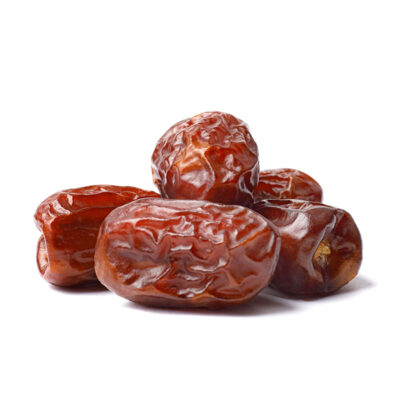Are Dates Good for Diabetes? Nutrition and Benefits
Diabetes is a long-term disease in which the blood sugar levels are too high. People with diabetes always look for natural sweeteners to curb their sweet cravings. Dates are one such sweetener. This article helps you know if dates are good for diabetes, their nutritional value, and their benefits for diabetes.

Dates, the delicious, meaty fruits of the date palm tree, are one of the most popular foods in the Middle East. Their health benefits and amazing nutritional qualities have been enjoyed for over 6,000 years by people all over the world.
As people become more conscious of their health, they are switching to healthier options, improving the flavor and sweetness of food. One such treat has been dates, which have become an option for those craving something sweet.
If you have diabetes, you might be worried about the effect of dates’ natural sweetness on your blood glucose levels. Let’s examine how this small natural sweetener can be included in your diet even if you have diabetes.
Are Dates Good for Diabetes?
It’s safe to say that people with diabetes can eat dates. They are a medium-glycemic food and contain several vitamins and minerals such as carbs, fiber, potassium, protein, magnesium, manganese, copper, iron, antioxidants, and vitamin B6, which can help alleviate the symptoms of diabetes.
Unlike other fruits and vegetables, dates have a low GI that cannot cause a rise in glucose levels. This implies that, within limits, people with diabetes can consume them.
The fiber in dates is important for blood sugar control in the bloodstream and controlling insulin production. Fiber helps slow digestion down, which can help lower glucose levels after eating.
The fiber content of dates may help lower blood pressure and inflammation, which are the risk factors for diabetes. Consumption of fiber also helps reduce the risk of type 2 diabetes, triglyceride levels, and cholesterol absorption, reducing LDL (bad cholesterol) levels in the blood.
Dates are also one of the healthiest snacks you may have at any moment if you’re hungry.
Do Dates Spike Blood Sugar?
When consumed in moderation, dates cannot cause blood sugar spikes because they have a low GI and medium glycemic load. GI measures how quickly blood sugar rises after eating a meal. The lower the GI, the slower the rise.
Although dates have a higher sugar content than other foods like sugary cereal or jelly beans, they have no negative impact on people with diabetes when it comes to blood glucose levels.
Additionally, a 2015 study of 15 people with diabetes showed that consuming 15g of carbs from raisins or dates had no impact on blood sugar levels 30 minutes, 60 minutes, or 120 minutes afterward.
Dates Nutritional Value
A 100g serving of dates provides the following nutrients, according to the USDA:

The nutritional profile of dates is excellent. Dates have a similar calorie content to raisins and figs but higher calorie content than most fresh fruit.
Dates provide a lot of calories from carbohydrates. A very small amount of protein makes up the rest. Despite their high-calorie content, dates are rich in fiber and certain essential vitamins and minerals.
The protein content of dates is higher than that of other fruits such as apples, bananas, oranges, etc. They are also high in antioxidants, phenols, and micronutrients.
Glycemic Index of Dates
Dates are low-glycemic-index fruits, have a medium glycemic load (GL), and are a rich source of fiber. According to research, the average GI of dates is 42. They are low GI foods, and when eaten in moderation, they’re safe for those with diabetes.
The GI is crucial in determining if dates suit people with diabetes. The GI of food shows how it can affect glucose levels. Foods with higher GI values cause a spike in blood sugar levels, while foods with lower GI values cause lower blood sugar levels. Foods with a GI value below 55 are considered low-GI foods.
Although the GI and GL ideas were initially created to help people with diabetes choose the healthiest meals, they can be used by healthy people and people with diabetes to manage glucose levels better and plan healthy diets.
Which Dates Are Good for Diabetes?
Dried dates are good for diabetes. This is because they boost metabolism, provide a good supply of iron, potassium, and calcium, and offer sufficient fiber and protein. Dates are, therefore, best eaten when they are dried.
Although dried dates and fresh dates contain almost the same amount of nutrients, dried dates are packed with more fiber than fresh ones, making them helpful in relieving the stomach and reducing constipation.
Dried dates are also rich in iron, which is beneficial for diabetes. Inadequate consumption of iron causes fatigue, and iron deficits are prevalent. The composition of high iron levels and carbohydrates in dates can be a beneficial energy booster.
Among fruits, dried dates have the second-highest phytoestrogen concentration. Because they help improve blood glucose management and decrease insulin resistance, dietary phytoestrogens benefit people with diabetes and obese people.
Are Dates Good for People With Prediabetes?
People with prediabetes can enjoy the benefits of eating dates, but they should eat them in moderation. The same foods that are good for those with diabetes can also be helpful to individuals with prediabetes.
A diet high in magnesium has been shown to reduce the prevalence of type 2 diabetes and help in weight loss. Other studies suggest that taking supplements and vitamins may help lower blood sugar levels in people with prediabetes and low magnesium levels.
People with prediabetes should carefully monitor their carbohydrate intake to prevent blood sugar changes that can lead to type 2 diabetes.
3 Benefits of Dates for Diabetes
Dates are packed with nutrients that offer many health benefits to your body, from lowering cholesterol levels to strengthening your bones, improving the digestive system, and promoting brain health. Here are more benefits of eating dates for diabetes.
#1 Dietary fiber
Besides having a lot of calories and carbohydrates, every date palm is a rich source of dietary fiber – between 6.4 and 11.5% of the fruit.
The smaller amounts of fiber in dates are soluble, while the large amounts exist in an insoluble form, which gives the digestive tract additional roughage. This promotes lower cholesterol levels, prevents blood sugar spikes, and helps you lose weight.
Dates are also shown to help prevent colorectal cancer without causing a change in the microbiota.
#2 Rich in magnesium
People with type 2 diabetes frequently have low magnesium levels in their bodies. Various dates, such as the Two Pitted Medjool dates, have 26mg of magnesium, which plays an essential role in glucose management.
Additionally, the mineral has a significant role in blood pressure regulation, which is crucial for people with diabetes. This is because people with diabetes are more likely to develop high blood pressure.
#3 Source of antioxidants and phytoestrogens
Besides their mineral and vitamin content, dates are rich in protective and natural antioxidants, which can be helpful in the management of oxidative stress-related conditions.
Oxidative stress results when the body’s capacity to protect cells from damage by free radicals is inadequate compared to the rate at which they are produced. It’s an early sign of aging and cell damage that can cause diseases.
Dried dates also have the highest concentration of phytoestrogens. These are organic compounds with effects similar to those of the estrogen hormone. Dietary phytoestrogens help in reducing insulin resistance and increasing blood sugar regulation.
FAQs
Despite having a low GI, dates are high in calories and carbohydrates, which can increase blood sugar levels and lead to weight gain. As a result, people with diabetes are advised to eat 2–3 dates per day.
Dried dates are good for people with diabetes because they are a rich source of polyphenols that help manage diabetes and other health benefits, including better digestion and even cancer prevention. Additionally, they contain vitamins and nutrients that can offer more benefits.
Studies suggest that dates may help our bodies absorb sugar more slowly. This can assist in lowering blood sugar levels, which can help with managing weight and minimizing the chance of developing diabetes.
A Word From Our MD
People with diabetes can eat dates. However, you should be mindful of their glycemic indices, serving sizes, and nutritional composition. To be safe, we advise consuming no more than three dates per day.
Make sure to serve them with high-protein foods. You can also eat chopped dates in a bowl with other dried fruits, such as raisins, prunes, and plums. Remember to check their carbohydrate content too.
Due to dates’ natural sweetness, you can combine them with water and then boil them to create a syrup. The glycemic index and load of the date syrup will not change.
This is because you only use the fruit’s natural amounts of fructose, not any additional sugar. You can drizzle a little syrup into your coffee, juices, smoothies, or protein shakes. Even if you have diabetes, you can enjoy this form of sugar because it is more natural.
Conclusion
Dates are tropical fruits that are delicious and high in nutrients. In addition to fructose and dietary fiber, they are rich in vitamins A, K, and B. Due to their low GI value, dates do not significantly raise blood sugar levels. They might even be safe for people with diabetes to consume, and they might help improve energy levels and vigor.
Dates are high in calories and carbohydrates, but regular consumption in healthy people does not seem to impact blood sugar levels. As a result, people with diabetes can eat dates in moderation (up to three per day). However, you should consult your doctor to confirm this is safe.

















































 Select your language:
Select your language: 








